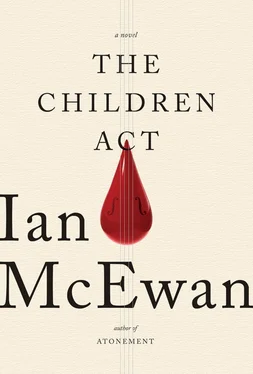She went slowly along Theobald’s Road, still holding off the moment of her return, wondering again whether it was not love she had lost so much as a modern form of respectability, whether it was not contempt and ostracism she feared, as in the novels of Flaubert and Tolstoy, but pity. To be the object of general pity was also a form of social death. The nineteenth century was closer than most women thought. To be caught out enacting her part in a cliché showed poor taste rather than a moral lapse. Restless husband in one last throw, brave wife maintaining her dignity, younger woman remote and blameless. And she had thought her acting days ended on a summer lawn, just before she fell in love.
As it turned out, coming home was not so difficult after all. She was occasionally back from work before Jack, and it surprised her to feel soothed as she stepped into the sanctuary dimness of the hall and its scent of lavender polish, and half pretend to herself that nothing had changed, or that it was about to come right. Before she turned on the lights she put her bag down and listened. The summer cold had brought on the central heating. Now the radiators ticked unevenly as they cooled. She heard the faint sound of orchestral music from a downstairs apartment, Mahler, langsam und ruhig . Less faintly, a song thrush pedantically repeating each ornamental phrase, the sound conducted cleanly down a chimney flue. Then she went through the rooms, turning on the lights, even though it was barely seven thirty. Back in the hall to retrieve her bag, she noticed that the locksmith had left no trace of his visit. Not even a wood shaving. Why should he, when he was only changing the barrel of the lock, and why should she care? But the absence of any trace of his visit was a reminder of Jack’s absence, a little tug downward on her spirits, and to counter it she took her papers into the kitchen and skimmed through one of the next day’s cases while she waited for the kettle to boil.
She could have phoned one of three friends, but she could not bear to hear herself explain her situation and make it irreversibly real. Too soon for sympathy or advice, too soon to hear Jack damned by loyal chums. Instead, she passed the evening in an empty state, a condition of numbness. She ate bread, cheese and olives with a glass of white wine, and passed an interminable period at the piano. First, in a spirit of defiance, she played through her Bach partita. Occasionally, she and a barrister, Mark Berner, performed songs, and she had seen that afternoon that he was listed for tomorrow to represent the hospital in the Jehovah’s Witness case. The next concert was many months ahead, just before Christmas, in the Great Hall in Gray’s Inn, and they had yet to agree on a program. But they had a few encore pieces off by heart and she played through them now, imagining the tenor’s part, lingering over Schubert’s mournful “Der Leiermann,” the hurdy-gurdy man, who is poor and wretched and ignored. Such concentration protected her from thoughts, and she had no sense of passing time. When she rose at last from the piano stool, her knees and hips were stiff. In the bathroom she bit into half of a sleeping pill, stared at the ragged remainder in her palm, then swallowed that too.
Twenty minutes later she lay in her half of the bed listening through closed eyes to the radio news, the shipping forecast, the national anthem, then the World Service. As she waited for oblivion, she heard the news again and perhaps a third time, then calm voices discussing the day’s savagery—suicide bombers in crowded public places in Pakistan and Iraq, shelling of apartment blocks in Syria, Islam’s war with itself conducted by means of twisted car frames and rubble, and body parts flung across marketplaces, and ordinary people wailing in shock and grief. Then the voices turned to discuss American drones over Waziristan, last week’s bloody assault on a wedding party. While the reasonable voices pressed on into the night, she curled up for a troubled sleep.
THE MORNING PASSED like a hundred others. Applications, submissions rapidly assimilated, argument heard, judgments delivered, orders dispensed, and Fiona moving between her room and the court, bumping into colleagues on the way, something even festive in their quick exchanges, the clerk’s weary call of “Court rise,” her minimal nod toward the opening barrister, her occasional weak joke fawningly received by counsel for both sides with little attempt to conceal their insincerity, and the litigants, if they were a divorcing couple, as they all were this Tuesday morning, seated well apart behind their representation, in no mood to smile.
And her mood? She counted herself reasonably adept at monitoring it, naming it, and she detected a significant shift. Yesterday, she now decided, she had been in shock, in an unreal state of acceptance, prepared to tell herself that she had, at worst, to endure the commiseration of family and friends and a degree of severe social inconvenience—those embossed invitations she must refuse while hoping to conceal her embarrassment. This morning, waking with a cold part of a bed to her left—a form of amputation—she felt the first conventional ache of abandonment. She thought of Jack at his best and longed for him, the hairy bony hardness of his shins, down which, half asleep, she would let the soft underside of her foot slide at the alarm clock’s first assault, when she would roll onto his outstretched arm and wait and doze beneath the duvet’s warmth, face into his chest, until the clock’s second call. That naked childlike surrender, before she rose to assume an adult’s armor, seemed first thing this morning like an essential from which she was banished. When she stood in the bathroom, when she stepped out of her pajamas, her body looked foolish in the full-length mirror. Miraculously shrunken in some parts, bloated in others. Bottom-heavy. A ridiculous package. Fragile, This Way Up. Why would anyone not leave her?
Washing, dressing, drinking coffee, leaving a note and arranging a new key for the cleaning lady brought these raw feelings under control. And so she began her morning, looked for her husband in e-mails, texts and post, found nothing, gathered her papers, her umbrella and her phone and walked to work. His silence appeared ruthless and it shocked her. She knew only that Melanie, the statistician, lived somewhere near Muswell Hill. Not impossible to track her down, or look for Jack at the university. But what humiliation then, to find him in a departmental corridor, walking toward her, arm in arm with his lover. Or to find him alone. What could she propose beyond a pointless, ignominious plea for his return? She could demand confirmation that he had left his marriage, and he would tell her what she already knew and didn’t want to hear. So she would wait until a certain book or shirt or tennis racket drew him back to the locked apartment. Then it would be his task to search her out, and when they spoke, she would be on her own ground, dignity intact, outwardly at least.
It would not have been apparent, but her spirits were heavy as she set about Tuesday’s list. The last case of the morning was prolonged by complex argument over commercial law. A divorcing husband claimed that the three million pounds he had been ordered to pay to his wife was not his to give away. It belonged to his company. It emerged, but far too slowly, that he was the sole director and only employee of an enterprise that made or did nothing—it was a fig leaf for a beneficial tax arrangement. Fiona found for the wife. The afternoon was now cleared for the hospital’s emergency application in the Jehovah’s Witness case. In her room once more, she ate a sandwich and an apple at her desk while she read through the submissions. Meanwhile, her colleagues were lunching splendidly at Lincoln’s Inn. Forty minutes later, one clarifying thought accompanied her as she made her way to courtroom eight. Here was a matter of life and death.
Читать дальше












